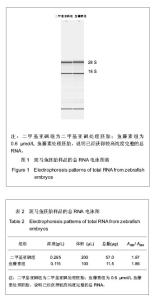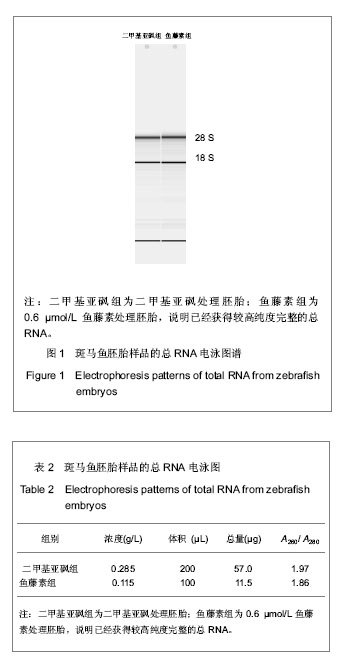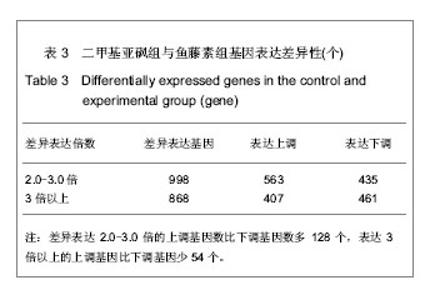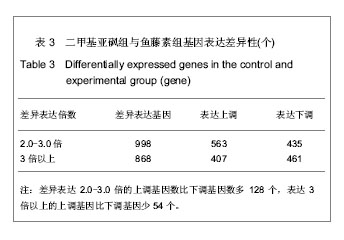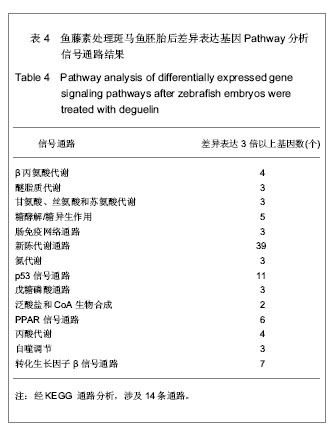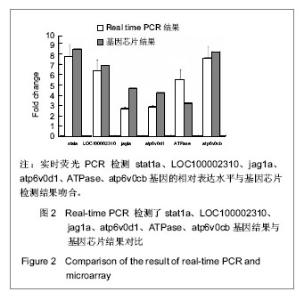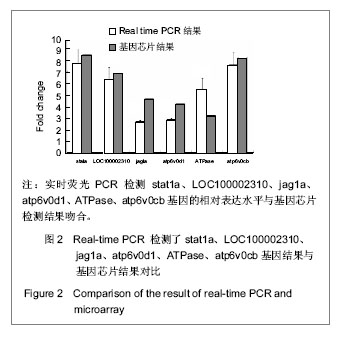| [1] |
Fei Jing, Zheng Hongdi, Yu Liya, Li Leiji.
Involvement of GDNF/PI3K/AKT pathway in promoting facial
nerve regeneration using electroacupuncture in a rabbit model of facial nerve
crush injury
[J]. Chinese Journal of Tissue Engineering Research, 2020, 24(7): 1094-1100.
|
| [2] |
Yuan Guoqiang, Qin Yongsheng, Peng Peng.
High-intensity interval training for treating pathological cardiac hypertrophy in spontaneously hypertensive rats: effects and mechanisms
[J]. Chinese Journal of Tissue Engineering Research, 2020, 24(23): 3708-3715.
|
| [3] |
Lin Jiebin, Shi Yuling, Gao Fenghe, Liang Zujian.
Bushen Tiaogan prescription reverses prednisone-induced
osteoporosis in zebrafish
[J]. Chinese Journal of Tissue Engineering Research, 2020, 24(20): 3146-3151.
|
| [4] |
Zhou Yanxing1, Peng Xinsheng2, Hou Gan1, Li Jiangbin1, Zhang Hua1, Zhou Zhikun2, Zhou Yanfang3 .
Inhibitory effect of capsaicin on fibroblast proliferation and its molecular mechanism
[J]. Chinese Journal of Tissue Engineering Research, 2019, 23(7): 1018-1022.
|
| [5] |
Liu Junyin, Feng Wei, Xie Yingchun, Li Yuwan, Zeng Jitao, Liu Ziming, Tu Xiaolin.
Bone morphologic protein signaling pathway in bone regeneration and repair: accurate regulation and treatment targets
[J]. Chinese Journal of Tissue Engineering Research, 2019, 23(4): 606-612.
|
| [6] |
Chen Deping1, Liu Shengze1, Chen Shi1, Cong Changchun2, Liu Shuyi3, Xiao Ying4 .
Effect of nerve growth factor-beta on proliferation of intraspinal schwannomas
[J]. Chinese Journal of Tissue Engineering Research, 2019, 23(15): 2373-2379.
|
| [7] |
Ao Xiaojing, Miao Mao, Tan Yaqin, Hao Hua.
Changes of cartilage extracellular matrix and Wnt singling pathway in rabbit models of osteoarthritis after treatment by fire-needle moxibustion at Dubi and Neixiyan
[J]. Chinese Journal of Tissue Engineering Research, 2019, 23(11): 1662-1668.
|
| [8] |
Zheng Chunyu1, Yu Xuefeng2, Chen Shuilin2, Xu Yier3, Han Zhongli4, Sun Guicai2.
Effects of aqueous extract of Sigesbeckia orientalis on JNK signaling pathway in rats with gouty arthritis
[J]. Chinese Journal of Tissue Engineering Research, 2018, 22(36): 5816-5820.
|
| [9] |
Zhong Yuan-ming1, Liang Zi-yang2, He Jia2, Xu Wei2, Mo Ri-yang2.
Notch signaling pathway and the nucleus pulposus cells in degenerative intervertebral disc: roles in the repair and reconstruction
[J]. Chinese Journal of Tissue Engineering Research, 2018, 22(20): 3256-3262.
|
| [10] |
Hou Xi-he, Zhang Ling-li, Li Hui, Wu Wei.
Exercise training for bone and lipid metabolisms: exercise intensity and duration are important factors
[J]. Chinese Journal of Tissue Engineering Research, 2018, 22(12): 1950-1955.
|
| [11] |
Zhang Yun-ge, Song Ke-guan.
Periprosthetic osteolysis induced by wear particles: research progress of calcineurin/activated T cell nuclear factor signaling pathway
[J]. Chinese Journal of Tissue Engineering Research, 2017, 21(7): 1115-1122.
|
| [12] |
Yang Yong-dong1, Zhao He1, Yu Xing1, Tang Xiang-sheng2, Hu Zhen-guo1, Chen Si-xue1, Liu Tao1, Xu Lin1.
Signaling pathways in secondary injuries following spinal cord injury
[J]. Chinese Journal of Tissue Engineering Research, 2017, 21(32): 5227-5233.
|
| [13] |
Fu Chang-long, Chen Hou-huang, Zhu Ding-yu, Wu Zhui-le, Xu Xin, Zheng Chun-song, Li Li, Liu Xian-xiang,Li Xi-hai, Wu Ming-xia.
Electroacupuncture delays articular cartilage degeneration in osteoarthritis via Ras-Raf-MEK1/2-ERK1/2 signaling pathway
[J]. Chinese Journal of Tissue Engineering Research, 2017, 21(24): 3790-3795.
|
| [14] |
Ma Zong-min, Li Shu-xian.
Mechanobiological model of bone remodeling based on mechano-growth factors
[J]. Chinese Journal of Tissue Engineering Research, 2017, 21(24): 3888-3893.
|
| [15] |
Xie Bing-jie, Feng Jie, Han Xiang-long.
Research advance in the biological characteristics of osteoclasts
[J]. Chinese Journal of Tissue Engineering Research, 2017, 21(11): 1770-1775.
|
